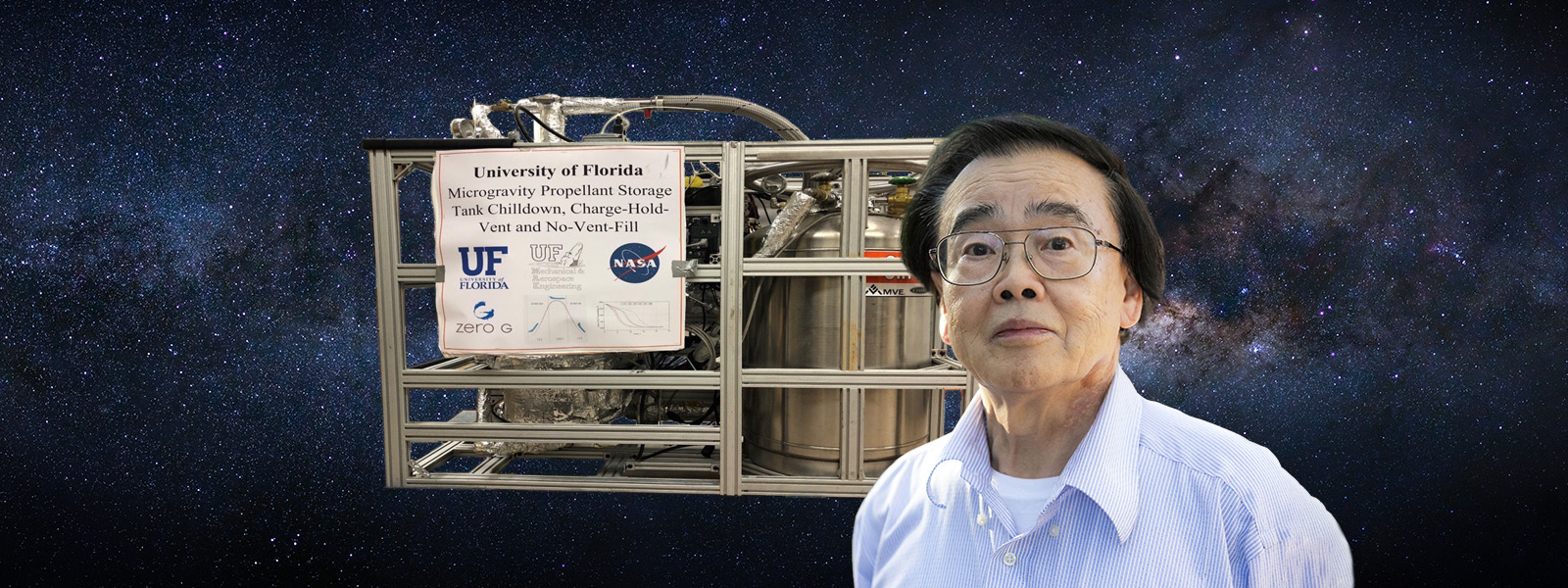As humanity presses on in the greatest and most ambitious adventure in its history, as our species extends its presence in space and travels ever farther into the wondrous depths of the universe, Dr. Jacob Chung continues to live and thrive on the cutting edge of what is possible.
Chung’s influence on the quest of exploration at the final frontier is so crucial. NASA has given the MAE professor $5.3 million in research grants over the past 20 years and he also made UF a national hotspot for NASA’s cryogenic thermal-fluid management program.
“For thermal management, my lab at the University of Florida is the most advanced, the pioneering lab in NASA,” he said. “What I feel very proud of is, I put the University of Florida on the map of NASA’s thermal management system.”
The main focus of Chung’s lab is the management, transport, handling, and storage of cryogenic propellant fluids in terrestrial, reduced gravity, and microgravity conditions alike. The real-world impact of this research is invaluable to the space travel industry because cryogenic propellant fluids are used in the life support systems, thermal management, power, and propulsion of spacecraft. A reliable supply of these fluids is critical for space missions, and therefore, the fluids must be managed effectively.
The propellants are liquid oxygen and liquid hydrogen, which both must be maintained at extremely cold temperatures in order to stay liquid (about -200 ˚C and -270 ˚C, respectively). The liquid fuel combustion system in engines involves mixing the oxygen, which acts as an oxidizer, and the hydrogen, which acts as a fuel, and the ensuing combustion provides thrust for the engine. Transporting the propellant from storage tanks to the engine, however, is difficult because the transferring pipes are usually around room temperature, and the engine could get damaged if the propellant isn’t still in liquid form. The challenge of chilling down the pipes and controlling the cooling of the propellants is a vital part of the processing procedures that Chung works on designing, and is the focus of one of his lab’s three main projects.
The second project has a similar aim, but applies to chilling down the storage tanks for the propellant. While with the pipes they’re able to use the forced flow of the liquid in methods to cool it down, this isn’t an option for the storage tanks. Instead, they use a cold spray on the walls of the tank to chill it.
The third project is about developing and manufacturing a coating or special surface for the storage tanks that would prevent pool boiling by controlling the number and type of nucleation sites, where micro-bubbles form in the liquid.
All three of these projects are providing research that will be indispensable to space missions as they aim to send humans increasingly far from home. Chung said that the most gratifying part of conducting his research is achieving new findings and contributing knowledge that no one has known before.
“If you’re a researcher, and your mission is to find out the heat transfer process, or whatever physical phenomenon, you don’t know. So that’s what the joy is,” he said. “You discover something which has not been known before.”
Since the launch of his time at UF in 1998, Chung’s work and research has rocketed to heights as dizzyingly impressive as the cosmos itself. After pioneering space cryogenic thermal management research, his lab remains the most well-equipped facility nationwide in this field. The expertise and demonstrated accomplishments of the lab are similarly unmatched.
In addition to this, his achievements include earning the College of Engineering Research Excellence Award (1988, while on the faculty of Washington State University), the UF Herbert Wertheim College of Engineering Doctoral Dissertation Advisor/Mentoring Award (2008), and the ASME Heat Transfer Memorial Award (2014). He has also authored and co-authored over 170 journal papers and one book, is a fellow of the American Society of Mechanical Engineers (ASME), and is a member of the American Association for the Advancement of Science.

